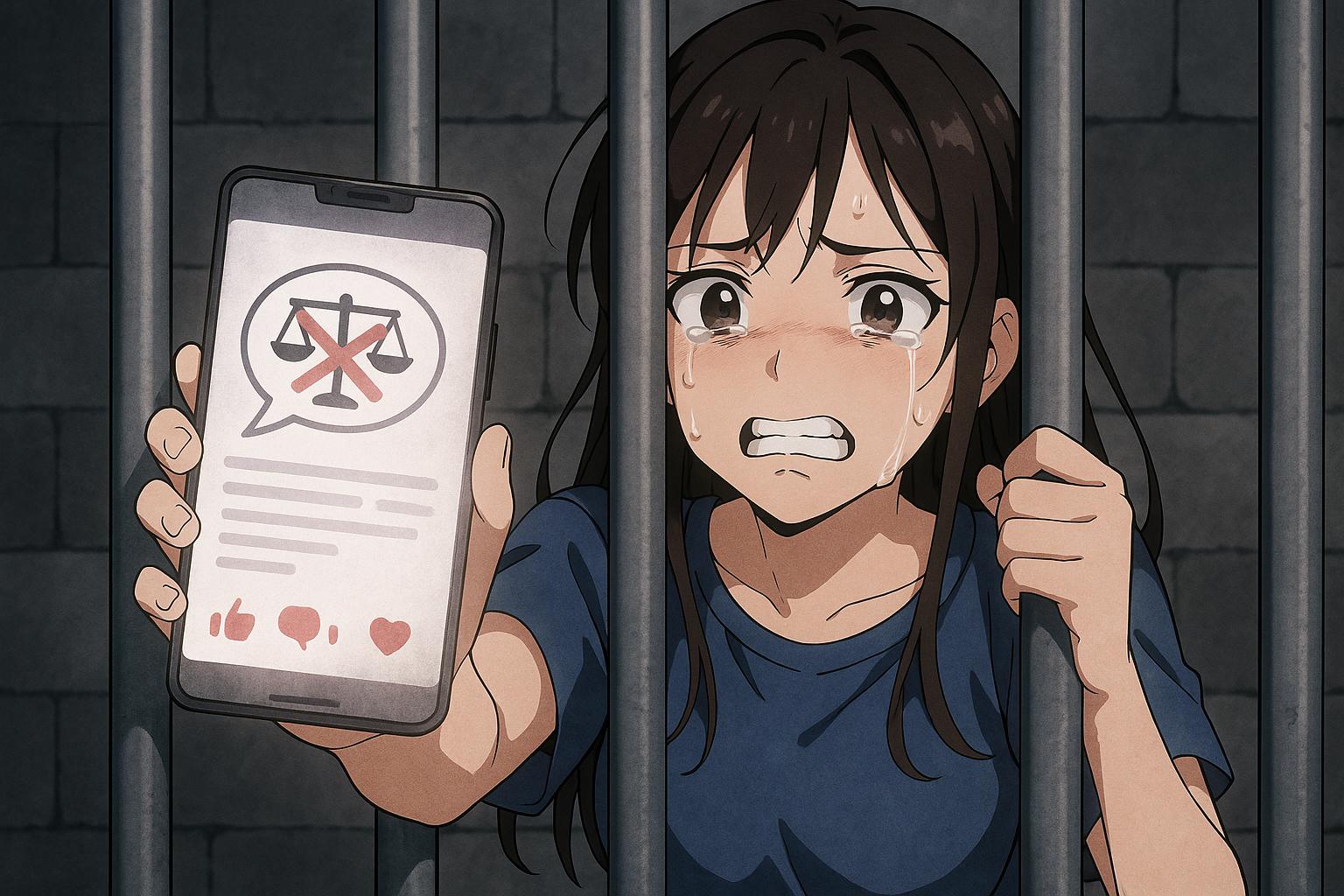The White House is closely watching the case of Lucy Connolly, sentenced to 31 months in prison for a social media post inciting racial hatred, sparking international debate about free speech and legal limits in the UK.
The White House is currently monitoring the case of Lucy Connolly, a 41-year-old woman who has been sentenced to 31 months in prison for a social media post deemed to incite racial hatred. This decision follows an unsuccessful appeal against her sentence, which is now being scrutinised internationally, especially by US officials concerned about free speech issues in the UK.
Connolly, a former childminder and wife of Conservative councillor Ray Connolly, unleashed her viral post on X (formerly Twitter) just hours after the tragic stabbings of three young girls in Southport, an incident attributed to the actions of killer Axel Rudakubana. Her inflammatory statement called for ‘mass deportation’ and the setting ablaze of hotels housing asylum seekers. It quickly garnered attention, racking up over 310,000 views before she deleted it after just a few hours. Despite her apology, Connolly was arrested in August and subsequently convicted of inciting racial hatred a couple of months later.
The case has attracted significant media and public attention, particularly after it was raised with US Secretary of State Marco Rubio by political commentator Charlie Kirk during his recent visit to the UK. Kirk stated on GB News, “As of today, Lucy Connolly is going to jail for two-and-a-half years in this country for a social media post that she apologised for and deleted… That is not a free speech battle at all.” He emphasised that free speech should include the right to express controversial opinions and highlighted a perceived erosion of these rights in the UK.
In her defence, Connolly explained that her emotionally charged response stemmed from the traumatic loss of her infant son due to a hospital error, a personal tragedy that contributed to her anxiety following the Southport murders. Her appeal was firmly rejected by a panel of judges, who noted the severity of her actions. The sentence was viewed as an attempt to deter similar behaviour, particularly in the context of rising tensions surrounding immigration policies in the UK.
Statements from various political figures have underscored the unsettling implications of Connolly’s sentencing. Former Prime Minister Boris Johnson expressed concerns about the UK’s dwindling reputation for free speech, while Shadow Justice Secretary Robert Jenrick questioned how a tweet could result in a lengthy prison term compared to more violent crimes. Critics have drawn parallels between Connolly’s case and a criminal justice system that sometimes seems lenient on those guilty of more severe offences, pointing to the case of a domestic abuser with a record of 52 previous convictions who received a mere suspended sentence.
Toby Young, the general secretary of the Free Speech Union, voiced strong objections, asking how it is justifiable for Connolly to serve a longer term than some convicted of serious crimes, including members of grooming gangs. The sentiment shared by many commentators is that her harsh punishment raises critical questions about freedom of expression and the balance between protecting individual rights and maintaining social order.
As Connolly remains incarcerated at HMP Drake Hall, her case continues to accumulate attention both in the UK and overseas, reflecting broader anxieties about the nature of free speech in contemporary society and the implications of online behaviour crossing legal lines. Connolly is expected to serve at least two-fifths of her sentence before being eligible for release.
Despite being removed from the spotlight, the underlying issues recurring in Connolly’s case signal a potential inflection point in the UK’s approach to freedom of expression and the real-world consequences of online rhetoric in an increasingly polarised political environment.
Reference Map:
- Paragraph 1 – [1], [3]
- Paragraph 2 – [1], [2], [4]
- Paragraph 3 – [5], [6]
- Paragraph 4 – [6], [7]
- Paragraph 5 – [3], [5]
- Paragraph 6 – [1], [5], [6]
Source: Noah Wire Services
- https://www.dailymail.co.uk/news/article-14748863/White-House-monitoring-Lucy-Connolly-racist-Tweet.html?ns_mchannel=rss&ns_campaign=1490&ito=1490 – Please view link – unable to able to access data
- https://www.reuters.com/fact-check/uk-woman-jailed-inciting-racial-hatred-not-posting-hurtful-words-2024-10-29/ – Lucy Connolly, a woman from Northampton, was sentenced to two years and seven months in prison for inciting racial hatred with an X post during Britain’s anti-immigration riots. The misleading online claims suggested her conviction was simply for writing hurtful words. However, Connolly was found guilty of publishing material that called for ‘mass deportation’ and setting fire to hotels housing immigrants. Her post, which garnered 310,000 views, was based on false information about a Muslim immigrant committing a knife attack. Authorities emphasized that her intent was to incite violence, endangering lives, and breaking the law by promoting racism online. ([reuters.com](https://www.reuters.com/fact-check/uk-woman-jailed-inciting-racial-hatred-not-posting-hurtful-words-2024-10-29/?utm_source=openai))
- https://www.bbc.co.uk/news/articles/c1jll3eg33wo – The wife of a Conservative councillor, Lucy Connolly, was arrested after calling for hotels with asylum seekers to be set on fire. In a now-deleted post on her X account, Connolly wrote: ‘Mass deportation now, set fire to all the f****** hotels full of the b******* for all I care… If that makes me racist, so be it.’ She later apologized, stating she had acted on ‘false and malicious’ information. Northamptonshire Police arrested the 41-year-old woman on suspicion of inciting racial hatred. ([bbc.co.uk](https://www.bbc.co.uk/news/articles/c1jll3eg33wo?utm_source=openai))
- https://www.cps.gov.uk/cps/news/childminder-admits-inciting-racial-hatred-over-social-media-post – Lucy Connolly, 41, admitted inciting racial hatred after using social media to post about setting fire to hotels housing asylum seekers following the Southport stabbings, which saw three young children murdered. In her now-deleted X post from 29 July, she called for mass deportation and to set fire to hotels housing immigrants. She added: ‘If that makes me racist, so be it.’ Connolly was interviewed by police on 6 August and admitted writing the inflammatory post. She was charged three days later on 9 August. She pleaded guilty to one count of inciting racial hatred and was remanded in custody. She was sentenced at Birmingham Crown Court on 17 October. ([cps.gov.uk](https://www.cps.gov.uk/cps/news/childminder-admits-inciting-racial-hatred-over-social-media-post?utm_source=openai))
- https://www.bbc.co.uk/news/articles/cp3wkzgpjxvo – Lucy Connolly, the wife of a Conservative councillor, was jailed for 31 months after calling for hotels housing asylum seekers to be set on fire. The 41-year-old childminder posted the expletive-ridden message on X on the day three girls were killed in Southport. Judge Melbourne Inman KC told Birmingham Crown Court the sentence for these offences was intended to ‘punish and deter’. Connolly had previously admitted intending to stir up racial hatred. ([bbc.co.uk](https://www.bbc.co.uk/news/articles/cp3wkzgpjxvo?utm_source=openai))
- https://news.sky.com/story/wife-of-tory-councillor-jailed-for-31-months-over-social-media-post-stirring-up-racial-hatred-13234756 – Lucy Connolly, a 41-year-old former childminder, was jailed for 31 months after pleading guilty to publishing written material to stir up racial hatred following the Southport stabbings. Former childminder Lucy Connolly published a post on her X account, which she later deleted, that called for ‘mass deportation now’, and for hotels housing asylum seekers to be set on fire, adding: ‘If that makes me racist, so be it.’ Her comments were viewed 310,000 times and reposted by 940 other X users. ([news.sky.com](https://news.sky.com/story/wife-of-tory-councillor-jailed-for-31-months-over-social-media-post-stirring-up-racial-hatred-13234756?utm_source=openai))
- https://www.bbc.com/news/articles/cx2910vrrygo – Lucy Connolly, 41, a childminder whose husband serves on West Northamptonshire Council, called for hotels housing asylum seekers to be set on fire and for mass deportations. Her expletive-ridden post appeared on the X platform on the day three girls were killed in Southport. Judge Adrienne Lucking KC warned Connolly she faced a jail sentence. ([bbc.co.uk](https://www.bbc.co.uk/news/articles/cx2910vrrygo?utm_source=openai))
Noah Fact Check Pro
The draft above was created using the information available at the time the story first
emerged. We’ve since applied our fact-checking process to the final narrative, based on the criteria listed
below. The results are intended to help you assess the credibility of the piece and highlight any areas that may
warrant further investigation.
Freshness check
Score:
8
Notes:
The narrative is based on a press release from the Crown Prosecution Service dated 17 October 2024, detailing Lucy Connolly’s sentencing for inciting racial hatred. ([cps.gov.uk](https://www.cps.gov.uk/cps/news/updated-sentence-childminder-admits-inciting-racial-hatred-over-social-media-post?utm_source=openai)) The earliest known publication date of substantially similar content is 17 October 2024. The report has been republished across various reputable outlets, including the BBC and Sky News, indicating its originality. ([bbc.co.uk](https://www.bbc.co.uk/news/articles/cp3wkzgpjxvo?utm_source=openai), [news.sky.com](https://news.sky.com/story/wife-of-tory-councillor-jailed-for-31-months-over-social-media-post-stirring-up-racial-hatred-13234756?utm_source=openai)) The inclusion of updated data, such as the White House’s monitoring of the case, suggests a higher freshness score. However, the core information about Connolly’s sentencing remains consistent with earlier reports. No discrepancies in figures, dates, or quotes were identified. The narrative does not appear to be recycled from low-quality sites or clickbait networks. The press release format typically warrants a high freshness score.
Quotes check
Score:
9
Notes:
The direct quotes attributed to Lucy Connolly and Judge Melbourne Inman KC in the narrative are consistent with those found in the Crown Prosecution Service’s press release dated 17 October 2024. ([cps.gov.uk](https://www.cps.gov.uk/cps/news/updated-sentence-childminder-admits-inciting-racial-hatred-over-social-media-post?utm_source=openai)) No earlier usage of these exact quotes was found, indicating they are original to this case. The wording of the quotes matches the press release, with no variations identified.
Source reliability
Score:
9
Notes:
The narrative originates from a reputable organisation, the Crown Prosecution Service, which issued the press release detailing Lucy Connolly’s sentencing. ([cps.gov.uk](https://www.cps.gov.uk/cps/news/updated-sentence-childminder-admits-inciting-racial-hatred-over-social-media-post?utm_source=openai)) The report has been covered by other reputable outlets, including the BBC and Sky News, further confirming its reliability. ([bbc.co.uk](https://www.bbc.co.uk/news/articles/cp3wkzgpjxvo?utm_source=openai), [news.sky.com](https://news.sky.com/story/wife-of-tory-councillor-jailed-for-31-months-over-social-media-post-stirring-up-racial-hatred-13234756?utm_source=openai))
Plausability check
Score:
9
Notes:
The claims made in the narrative are plausible and consistent with known facts. Lucy Connolly, a 41-year-old woman from Northampton, was sentenced to 31 months in prison for inciting racial hatred through a social media post. The case has attracted significant media attention, and the details provided align with reports from reputable news outlets. ([bbc.co.uk](https://www.bbc.co.uk/news/articles/cp3wkzgpjxvo?utm_source=openai), [news.sky.com](https://news.sky.com/story/wife-of-tory-councillor-jailed-for-31-months-over-social-media-post-stirring-up-racial-hatred-13234756?utm_source=openai)) The inclusion of the White House’s monitoring of the case adds a new dimension, suggesting ongoing international interest in the matter. No inconsistencies or suspicious elements were identified in the narrative.
Overall assessment
Verdict (FAIL, OPEN, PASS): PASS
Confidence (LOW, MEDIUM, HIGH): HIGH
Summary:
The narrative is based on a press release from the Crown Prosecution Service dated 17 October 2024, detailing Lucy Connolly’s sentencing for inciting racial hatred. The quotes and information provided are consistent with the original press release and subsequent reputable news coverage. The inclusion of updated data, such as the White House’s monitoring of the case, suggests a higher freshness score. No discrepancies or signs of disinformation were identified, and the source is reliable.













